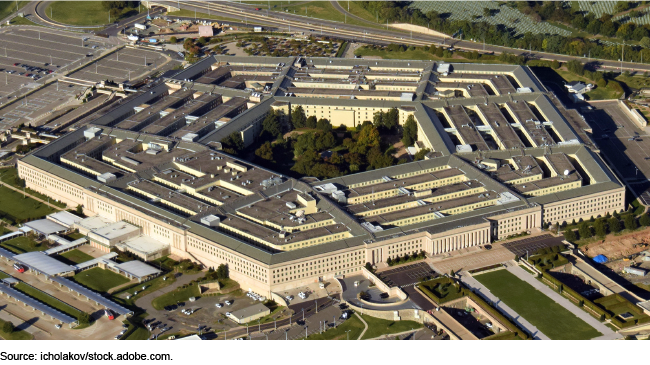DOD Intelligence: Actions Needed to Strengthen Program Oversight and Manage Risks
Fast Facts
The Department of Defense has an independent office responsible for overseeing DOD's intelligence activities and ensuring that they comply with federal law and agency directives.
From 2017-2022, the oversight office recommended hundreds of improvements to DOD's intelligence community. But the office hasn't monitored whether all these recommendations have been implemented.
Also, the oversight office has stopped inspecting individual offices and agencies and has shifted to assessing high-risk areas DOD-wide. Ceasing regular inspections introduces risks that will need to be mitigated.
Our recommendations to DOD address these and other issues.

Highlights
What GAO Found
The Department of Defense's (DOD) Senior Intelligence Oversight Official (SIOO) and DOD's intelligence oversight office have conducted oversight of DOD intelligence activities through a variety of means (see figure). For example, inspections of DOD components over the last 5 years have identified over 100 findings and recommendations for improvement to these components' intelligence oversight programs.
Tools Used by the Department of Defense's (DOD) Intelligence Oversight Office

However, GAO identified some risks that could adversely affect the future success of the DOD intelligence oversight office's oversight program:
- Incomplete monitoring of recommendations. The intelligence oversight office does not track the status of all recommendations it has made to DOD components. By improving its monitoring of prior recommendations, the office would know if components were addressing identified deficiencies.
- Halting inspections. In 2022, the office transitioned from conducting inspections of individual components to DOD-wide topic assessments. While assessments on intelligence topics such as DOD's counterdrug-funded analytical support may be warranted, the cessation of more specific inspections introduces risks—such as increased reliance on component oversight programs. Without taking steps to mitigate the risks of ceasing inspections, there may be fewer opportunities to identify improper activities.
- Lack of criteria for topic assessments. The office's process for its new topic assessments does not incorporate all 22 standards that GAO identified as necessary to develop high-quality and reliable products. For example, the office met most standards but somewhat met standards for quality control and assessing risk and independence of investigators. If the office meets all 22 standards, the office could increase confidence in the quality and credibility of the oversight information it provides to DOD leadership.
By addressing these risks, DOD would be better positioned to ensure its oversight of intelligence activities is effective.
Why GAO Did This Study
DOD recognizes that intelligence oversight is critical in enabling its components that perform authorized intelligence functions to carry out those functions in a manner that protects the constitutional rights of U.S. persons. In 1982, following a period of improper activities—including for example the interception of communications of civil rights protesters—DOD established an independent oversight office headed by the SIOO to oversee all DOD intelligence and intelligence-related activities.
GAO was asked to review DOD's intelligence oversight office. This report, among other objectives, assesses the office's oversight activities and the extent to which DOD faces risks to the success of the office's oversight program.
GAO reviewed relevant documents, including DOD directives, inspection reports, and planned topic assessments. GAO developed and applied criteria for high-quality and credible reports to the office's intelligence topic assessments. GAO also visited 15 DOD components that conduct intelligence oversight and interviewed relevant officials.
Recommendations
GAO is making three recommendations to DOD: (1) improve the monitoring of inspection recommendations; (2) mitigate risks of not conducting inspections; and (3) improve its topic assessments by meeting all standards for high-quality and credible reports. DOD agreed with the first two recommendations and partially agreed with the third. GAO continues to believe it is valid, as discussed in the report.
Recommendations for Executive Action
| Agency Affected | Recommendation | Status |
|---|---|---|
| Department of Defense | The Secretary of Defense should ensure that DOD's Senior Intelligence Oversight Official improve the DOD intelligence oversight office's monitoring process for inspection recommendations. (Recommendation 1) |
When we confirm what actions the agency has taken in response to this recommendation, we will provide updated information.
|
| Department of Defense | The Secretary of Defense should ensure that DOD's Senior Intelligence Oversight Official take steps to mitigate the risks of not conducting intelligence oversight inspections. (Recommendation 2) |
When we confirm what actions the agency has taken in response to this recommendation, we will provide updated information.
|
| Department of Defense | The Secretary of Defense should ensure that DOD's Senior Intelligence Oversight Official improves the DOD intelligence oversight office's topic assessment process by fully meeting all 22 standards that GAO identified for producing high-quality and credible reports. (Recommendation 3) |
When we confirm what actions the agency has taken in response to this recommendation, we will provide updated information.
|
